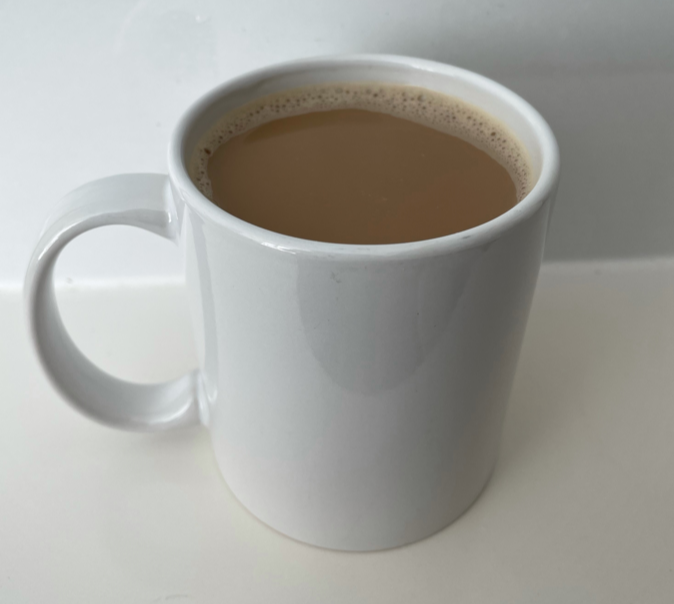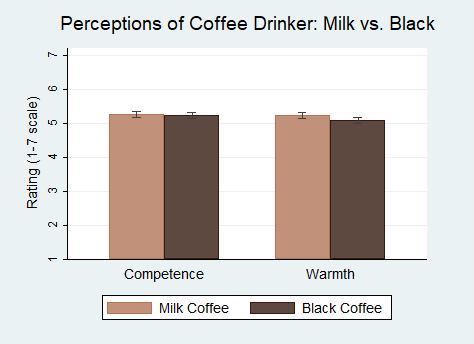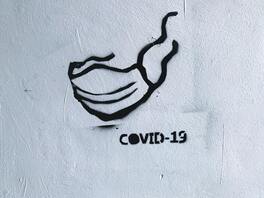Overview
Almost two-thirds of U.S. adults drink coffee. Visit your local coffee shop and you’ll find what seems to be just as many ways to make it. Frappuccinos, mochas, macchiatos, café lattes, the list goes on. But perhaps the most common way to drink coffee, the preference of about a third of coffee drinkers, is black. Indeed, even without the milk and sugar there are numerous ways to make black coffee, such as French press, espresso, pour over, and of course, the classic “drip” brew in a coffee pot.
Coffee culture, much like the beverage, is strong. It made us wonder how people psychologically perceive people who drink certain types of coffee. This wouldn’t be the first time we find such an effect. In one experiment, we found that wine drinkers are perceived to be more sophisticated. Might people who take their coffee black or with milk evoke certain psychological perceptions as well?
A classic pair of outcomes in psychology is warmth and competence. We hypothesized that black coffee drinkers may seem more competent, whereas those who take milk with their coffee might seem more warm (i.e., friendly).
The Experiment
We recruited 400 people from Amazon Mechanical Turk to view a short vignette about a co-worker drinking coffee, followed by a picture of either black coffee or coffee with milk (randomly assigned).
Participants were told to “Imagine you work in an office and you notice that one of your co-workers is drinking coffee, pictured below.” Participants were then shown one of the two photos below, which were taken by the researcher.
Almost two-thirds of U.S. adults drink coffee. Visit your local coffee shop and you’ll find what seems to be just as many ways to make it. Frappuccinos, mochas, macchiatos, café lattes, the list goes on. But perhaps the most common way to drink coffee, the preference of about a third of coffee drinkers, is black. Indeed, even without the milk and sugar there are numerous ways to make black coffee, such as French press, espresso, pour over, and of course, the classic “drip” brew in a coffee pot.
Coffee culture, much like the beverage, is strong. It made us wonder how people psychologically perceive people who drink certain types of coffee. This wouldn’t be the first time we find such an effect. In one experiment, we found that wine drinkers are perceived to be more sophisticated. Might people who take their coffee black or with milk evoke certain psychological perceptions as well?
A classic pair of outcomes in psychology is warmth and competence. We hypothesized that black coffee drinkers may seem more competent, whereas those who take milk with their coffee might seem more warm (i.e., friendly).
The Experiment
We recruited 400 people from Amazon Mechanical Turk to view a short vignette about a co-worker drinking coffee, followed by a picture of either black coffee or coffee with milk (randomly assigned).
Participants were told to “Imagine you work in an office and you notice that one of your co-workers is drinking coffee, pictured below.” Participants were then shown one of the two photos below, which were taken by the researcher.
Participants were then asked, “To what extent do you feel each of the following words describe this co-worker? (1 = Not at all, 7 = Very much” using a 1-7 scale. Two words were provided for participants to rate, “Competent” and “Friendly.” Note that we used friendly instead of warm so as not to confuse it with temperature, given that black coffee might be perceived as higher temperature than milk coffee.
Finally, to test whether perceptions differ between those who do and don’t drink coffee, we also measured whether each participant regularly drinks coffee. At the end of the survey, we asked participants “Do you drink coffee at least once every 1-2 weeks?” with answer options “Yes” and “No.”
Results
An independent samples t-test showed no significant difference in perceived competence between our coffee with milk drinker (avg. = 5.27) and our black coffee drinker (avg. = 5.23), (p = 0.769). Nor was there a significant difference in perceived warmth between our coffee with milk drinker (avg. = 5.24) and our black coffee drinker (avg. = 5.09), (p = 0.253). So neither of our hypotheses were supported.
Finally, we noted that about 88% of our sample drinks coffee. Although none of the results were affected by whether participants did or did not regularly drink coffee, we can’t say for sure that no such effect exists due to the small number of non-drinkers of coffee in our sample. We’ll leave that for future researchers to study.
In conclusion, it looks like there’s no boost in perceived warmth or competence for drinking your coffee black or with milk or cream. It’d be interesting to test whether other psychological outcomes like sophistication would be affected, or whether certain extravagant drinks like unicorn frappuccinos might be viewed differently. There are enough coffee drinkers out there who’d probably like to know.
In conclusion, it looks like there’s no boost in perceived warmth or competence for drinking your coffee black or with milk or cream. It’d be interesting to test whether other psychological outcomes like sophistication would be affected, or whether certain extravagant drinks like unicorn frappuccinos might be viewed differently. There are enough coffee drinkers out there who’d probably like to know.
Methods Note:
We used an independent samples t-test to test for significant differences in perceptions between our black coffee and milk coffee drinker, For significant differences, the coefficient would be large and its corresponding “p-value” would be small. If the p-value is less than 0.05, we consider the difference statistically significant. To test for interactions (a difference in the differences) between the main results and participants' age, gender, or coffee consumption habits, we used OLS regression analyses with interaction terms.
Popular Experiments
COVID MasksDoes wearing a COVID mask affect how others think of you?
|
Video GamesAre video games more enjoyable than board games?
Does age or gender matter? |
Zero-Sum PoliticsDo Democrats or Republicans view society as win-lose?
|






